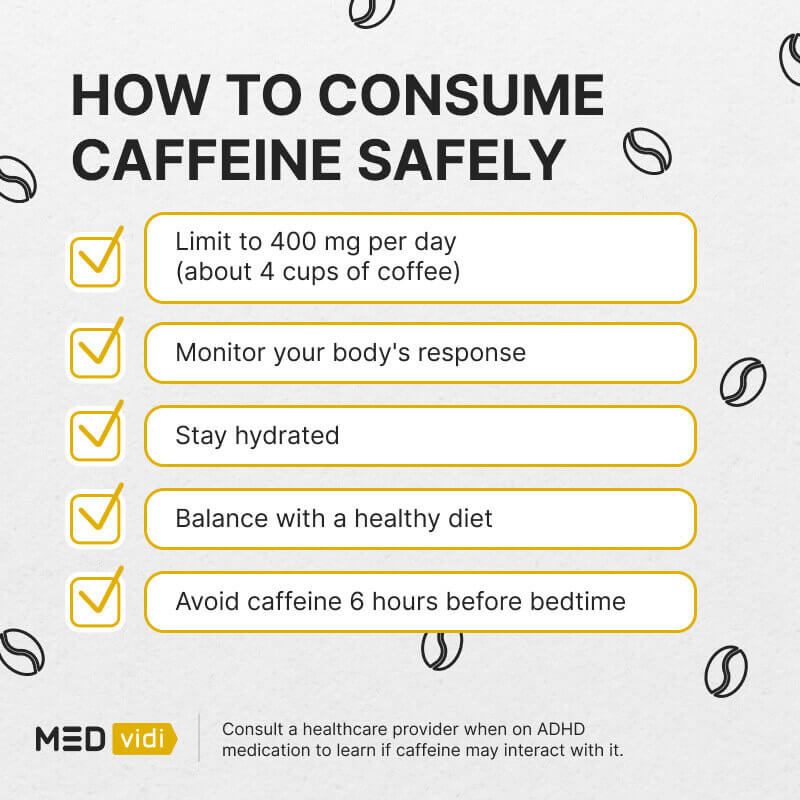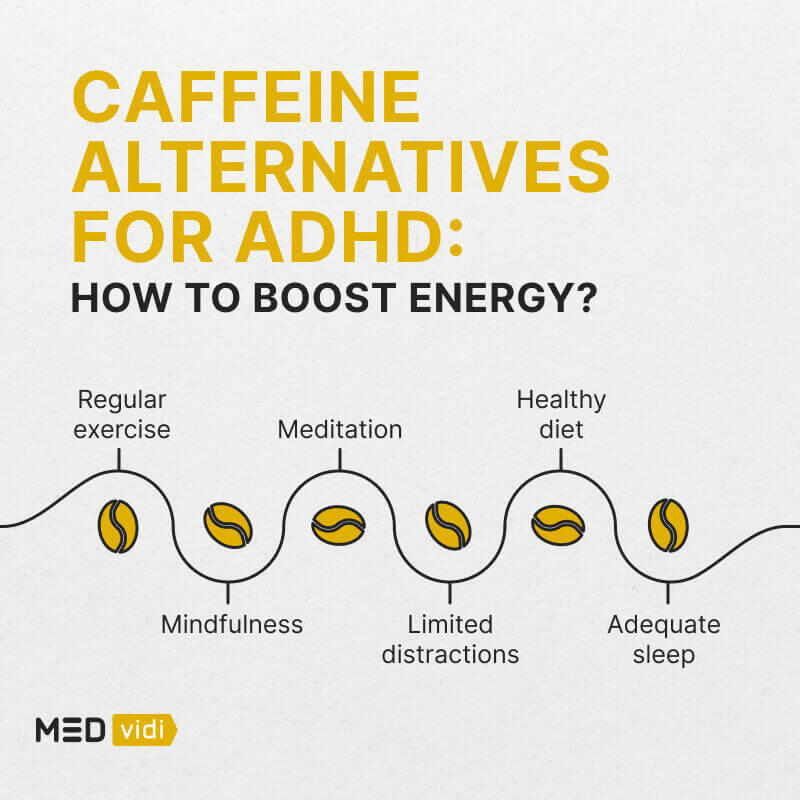Highlights
- Caffeine is a stimulant (like many ADHD medications, but with milder effects) and may offer temporary improvements in focus and alertness.
- Caffeine can also worsen some ADHD symptoms like restlessness, anxiety, and sleep issues — especially in higher doses.
- Everyone responds to caffeine differently, so it’s important to monitor how it affects your symptoms if you live with ADHD.
Most Americans have at least one caffeinated beverage
If you live with ADHD, you may have felt before that caffeine actually helps you function better — you might feel more alert, motivated, and energized. However, while caffeine could have some benefits for the symptoms, it can make some people with ADHD tired or sleepy. Here, we’ll go over the science behind caffeine, how it affects your brain, and what this might mean for those with ADHD.
The Science Behind Caffeine
Caffeine is a natural stimulant found primarily in coffee, tea, and cacao plants. It is also a key ingredient in many energy drinks and some medications. Caffeine can be found in:
- Coffee and coffee drinks
- Tea leaves
- Kola nuts
- Coca-Cola and other fountain drinks
- Chocolate
- Energy drinks
As a stimulant, caffeine increases activity in your central nervous system, which is responsible for attention, energy, and arousal. It speeds up communication between your brain and body and helps you feel more awake and alert in the short term.
Caffeine’s Effect on the Brain and Body
Caffeine, like other stimulants,
Some other effects are the following:
- Stimulates your brain and body. Caffeine activates the central nervous system, which can make you feel more awake and focused.
- Increases dopamine signaling. Caffeine enhances dopamine activity, which can temporarily improve motivation, attention, and mood — all areas that people with ADHD often struggle with.
- Raises physical energy. Caffeine can cause a noticeable increase in heart rate, blood pressure, and energy levels shortly after consumption.

How Does Coffee Affect ADHD?
The question of how, exactly, caffeine affects people with ADHD — and whether it’s helpful or harmful — is complicated. It can have some benefits, but it can have some drawbacks as well. There is not enough research on treating ADHD with caffeine, but it’s known it can’t replace ADHD medication.
Does Caffeine Help ADHD?
Caffeine doesn’t “help” ADHD, and it’s definitely not an adequate ADHD treatment. But it’s a stimulant, just like many ADHD medications. So, some people might find that it has a positive effect on some of their symptoms.
Some of the
- Improved attention. Caffeine’s stimulating effect on the brain can enhance focus and concentration, similar to how some ADHD medications work.
- Enhanced dopamine function. As coffee might help ADHD symptoms, its influence on dopamine, a neurotransmitter associated with reward and attention, is significant. This can lead to improved mood and cognitive function.
- Increased alertness. The stimulant properties of caffeine can help in overcoming the inattentive aspect of ADHD, leading to heightened alertness and better overall cognitive engagement.
- Better learning. Caffeine may help you stay more mentally engaged during tasks, which could make it easier to take in new information — especially during lectures or study sessions.
- Improved memory. Some studies show
caffeine may improve short-term memory[5] . particularly when you are tired. But its effect on long-term memory or learning retention isn’t as clear.
Risks and Limitations
But it’s not all good news; caffeine can also have some negative effects on certain people with ADHD. It can also interact with ADHD symptoms and medications in ways that can even be dangerous for some.
- Increased restlessness. In some people with ADHD, caffeine can exacerbate restlessness, which can be especially unfavorable for those with predominantly hyperactive type of ADHD.
- Insomnia. The stimulant effect of caffeine may lead to sleep disturbances, including insomnia. Sleep troubles and ADHD can get locked in a vicious cycle.
- Increased heart rate. Caffeine can cause a heightened heart rate.
- Heightened anxiety. For some, caffeine intake can result in
increased anxiety[6] , which can negatively affect ADHD symptoms. - Risk of caffeine addiction. Excessive caffeine consumption can heighten your risk of becoming
addicted to it[7] , which can lead to side effects and withdrawal symptoms. - Medication interactions. Caffeine can intensify the effects of ADHD medications, which might lead to overstimulation or increase the risk of side effects.
In addition, it’s important to note that caffeine can have
Caffeine is not appropriate as a treatment for ADHD. The research has not found it to be completely safe or effective. That doesn’t necessarily mean that you need to avoid caffeine completely, but it’s important to be aware of how it affects you uniquely, and also understand that it should never replace professional ADHD treatment.
Can Caffeine Make People With ADHD Tired and Sleepy?
Typically, caffeine increases alertness — in
If you live with ADHD, you can get locked in a vicious cycle when it comes to your sleep. You might use caffeine to power through a day after poor sleep — but that same caffeine can then keep you up again at night. Over time, the cycle repeats, leaving you even more exhausted and more symptomatic, even though you are trying to stay functional.
So, fatigue caused by sleep issues is a common reason for feeling tired or sleepy after drinking coffee. However, there are also some other possible explanations for this paradoxical reaction in people with ADHD:
- Brain chemistry. Dopamine regulation may
differ in people with ADHD[9] . So, an increase in dopamine levels caused by caffeine may also be different, potentially leading to calmness or tiredness rather than alertness. - Individual response. People have varying responses and sensitivity to caffeine, regardless of whether they have ADHD. Some may experience improved focus while others may feel tired.
How to Safely Consume Caffeine With ADHD
If you live with ADHD, then it’s important to be mindful about your caffeine consumption. Your goal isn’t to eliminate caffeine altogether — it’s to understand how it affects your symptoms so you can make choices that actually support your focus and energy. That kind of awareness is what helps you use caffeine in a way that works with your ADHD, not against it.
- Start with low amounts. People with ADHD should begin with smaller amounts of caffeine to assess how it affects their symptoms.
- Monitor personal sensitivity. Closely observe any changes you notice in focus, anxiety, or sleep patterns to understand your personal caffeine sensitivity.
- Consult with a healthcare provider. Discuss caffeine use with a healthcare professional, especially when taking ADHD medication.
- Keep the time in mind. Avoid consuming caffeine in the afternoon and evening, because it’s more likely to disrupt your sleep and get you locked in a vicious cycle.
- Gradually adjust intake. Based on tolerance, you can gradually adjust caffeine intake to find an optimal level where you see the benefits without adverse effects.


According to the FDA (Food and Drug Administration), having up to
Caffeine vs. ADHD Medication
You might wonder why caffeine can’t replace ADHD medication since they’re both central nervous system stimulants. In short, caffeine has just a mild, general stimulating effect while stimulant medications (like Adderall or Ritalin) are specifically designed and dosed to improve ADHD symptoms. It’s more difficult to control the dosage of caffeine, and studies haven’t found that it’s effective enough to help with ADHD symptoms. Research has found that both Adderall and Ritalin are
In certain dosages, combining caffeine and ADHD medication
Caffeine Alternatives for ADHD
Caffeine could offer some benefits, but it won’t help you manage your ADHD entirely. If you live with ADHD, you’ll need to consider other ways to increase and maintain your energy levels and manage other symptoms.
Here are some of the most common and effective ways to manage your day-to-day life with ADHD that don’t involve consuming caffeine.

Lifestyle Changes
If you are trying to boost your energy and manage other ADHD symptoms, it helps to start with the basics: move your body, eat consistently, and get enough sleep. These habits support both physical and mental health. And when it comes to focus and follow-through, structured activities like martial arts or team sports can make a big difference — especially when they become part of your routine.
Mindfulness
Mindfulness practices like meditation, yoga, and breathwork may help reduce stress and improve attention — and there’s some research to back this up.
Nutritional Supplements
The research behind nutritional supplements for ADHD is still lacking. But some studies show that supplements like omega-3 fatty acids, zinc, magnesium, and iron may help improve concentration and overall brain health. However, keep in mind that it’s important to consult with a healthcare provider before starting any supplements — just because it’s “natural” doesn’t necessarily mean it’s safe.
ADHD Treatment
ADHD medications are designed to target specific brain systems related to focus, attention, and impulse control. Many of them are also stimulants, but unlike caffeine, they’re prescribed in carefully controlled doses and have been studied extensively for safety and effectiveness. For many people, medication is
If you’re feeling overwhelmed or unsure where to start, online ADHD treatment at MEDvidi can connect you with professionals who understand what you’re going through and are here to help — on your schedule, from the comfort of home.
Bottom Line
Caffeine may improve attention and focus but it may also have the opposite effects on people with ADHD. It can also lead to increased anxiety and restlessness, so if you have ADHD, it’s important to be careful about your caffeine consumption. Be aware of your personal caffeine sensitivity, and never use caffeine to replace professional ADHD treatment.
Ultimately, a holistic approach that includes lifestyle changes, medication, and therapy is key for managing ADHD effectively. Book an appointment at MEDvidi today to have a detailed assessment and receive a personalized treatment plan for ADHD online.
FAQs
Is caffeine better than Adderall for ADHD?
Do people with ADHD need a lot of caffeine?
People with ADHD do not necessarily need a lot of caffeine. While a couple of cups of coffee a day can increase focus, caffeine affects individuals differently, and some people may experience increased anxiety or hyperactivity. In addition, it’s essential to consult your healthcare provider about interactions between caffeine and ADHD medication to avoid negative effects.
Is caffeine good for children with ADHD?
Caffeine is not typically recommended for children with ADHD, as it can worsen symptoms like anxiety and sleep issues. Safe treatment usually involves behavioral therapy and possibly medication, as prescribed by a healthcare professional.
Does coffee calm down ADHD?
Coffee does not universally reduce the symptoms of ADHD. While some individuals with ADHD might find that caffeine helps improve their focus, it can also increase anxiety and hyperactivity in others. The effect of coffee on ADHD symptoms varies among individuals.
Is caffeine bad for ADHD?
Caffeine’s impact on ADHD varies. For some, it may improve focus and concentration, but for others, it can exacerbate symptoms like anxiety and restlessness. It is not dangerous, but its effects are highly individualized.
Should people with ADHD drink energy drinks?
People with ADHD should generally be cautious with energy drinks. These drinks often contain high levels of caffeine and other stimulants that can exacerbate ADHD symptoms like restlessness and anxiety. It’s best to consult with a healthcare provider for personalized advice.
Is there a correlation between caffeine intake and hyperactivity?
It depends on how caffeine affects you personally. For some people with ADHD, caffeine could improve symptoms of hyperactivity. But for others, it could cause restlessness.













